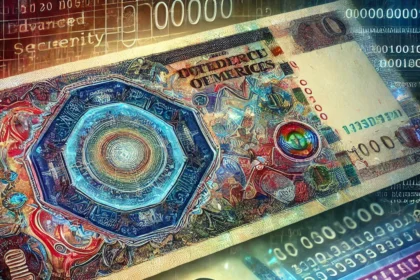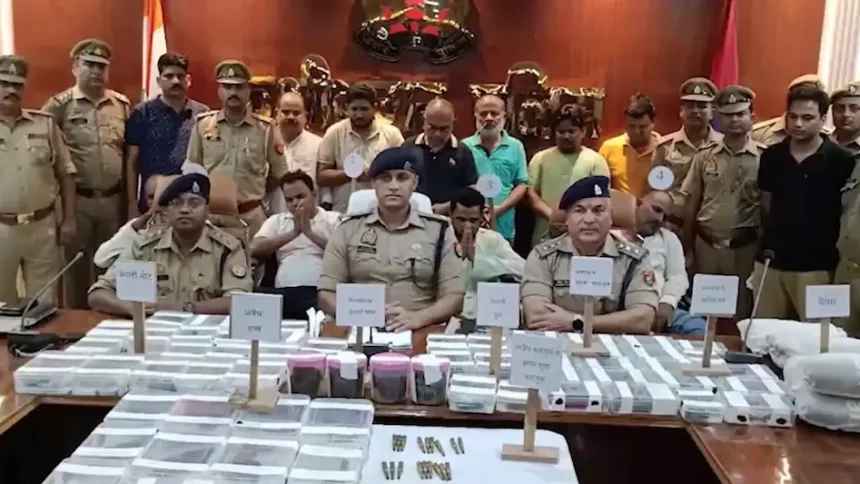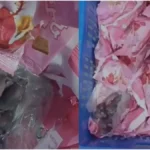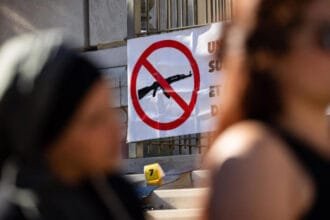In a major breakthrough, the Uttar Pradesh Police busted an international fake currency racket operating along the India-Nepal border, leading to the arrest of 10 individuals, including Rafiq Khan, a senior leader of the Samajwadi Party (SP). Rafiq Khan, who holds the position of National Secretary of the SP’s Lohia Vahini, has been identified as the key orchestrator behind the counterfeit currency operation. The racket, which has been active in areas near the India-Nepal border, is said to have supplied large amounts of fake currency in Uttar Pradesh, Bihar, and Nepal.
Details of the Fake Currency Racket Bust
On September 23, 2024, the police conducted raids in Kushinagar, leading to the arrest of Rafiq Khan and his accomplices. During the operation, the police recovered ₹5.62 lakh worth of fake Indian currency, ₹1.10 lakh in genuine currency, and 3,000 Nepalese rupees. Additionally, the police seized 10 country-made pistols, 4 explosive sutli bombs, 26 forged documents, and 2 Nepalese SIM cards from the arrested individuals. The criminal gang also possessed large amounts of ammunition, including 30 bullets and 12 shell casings.
According to reports, the fake currency racket had a well-established network that extended across the border into Nepal. The group was involved in the manufacturing and distribution of counterfeit currency notes, which were smuggled into India through Nepal. The counterfeit notes were then circulated across various districts in Uttar Pradesh and Bihar.
Key Players: Rafiq Khan and His Political Links
Rafiq Khan, a key leader of the Samajwadi Party’s Lohia Vahini wing, has been identified as the mastermind of this operation. His political affiliations have brought attention to the case, as a photo of Rafiq Khan with SP chief Akhilesh Yadav has gone viral on social media, stirring political controversy. This has prompted the opposition to raise questions about the party’s involvement in the racket.
Along with Rafiq Khan, another key player in the racket, Naushad Khan, who is the Vice President of the SP’s Cultural Wing, was also arrested. The involvement of such senior political figures in criminal activities has raised concerns, and it is feared that the racket may have deeper political connections.
The Uttar Pradesh police stated that the arrested gang had been active in the region for several months, using their political clout to avoid detection. This case has raised several concerns about the use of political influence in organized crime, particularly in counterfeit currency operations.

The Nexus Between India and Nepal
One of the most concerning aspects of this case is the international dimension of the racket. The police investigation has revealed that the fake currency operation had strong links to Nepal, where a significant portion of the counterfeit notes was being printed and smuggled into India.
Due to the porous borders between India and Nepal, smuggling counterfeit currency has become a lucrative criminal enterprise. Criminal networks on both sides of the border use the India-Nepal trade routes to circulate fake notes, causing significant damage to India’s economy. In recent years, authorities have intensified efforts to crack down on this cross-border smuggling, and the arrest of Rafiq Khan’s gang represents one of the largest busts to date.
Political Fallout: Impact on the Samajwadi Party
The involvement of senior leaders of the Samajwadi Party in the fake currency racket has created a political uproar. Opposition parties have criticized the SP leadership, calling for an investigation into the party’s connections to the criminal underworld. The viral image of Rafiq Khan with Akhilesh Yadav has further intensified the backlash, with many calling for accountability and demanding that the SP distance itself from the accused.
In response, the Samajwadi Party has issued a statement claiming that the party has no connection to Rafiq Khan’s criminal activities and that appropriate legal action should be taken against anyone found guilty. The SP has reiterated its commitment to transparency and law enforcement.
Police Investigation and Legal Action
The Superintendent of Police (SP) of Kushinagar, Santosh Mishra, confirmed that the arrested individuals are part of a larger network involved in smuggling counterfeit currency across the India-Nepal border. Mishra stated, “This is a major breakthrough in the fight against fake currency. We will continue investigating and identifying other members of this criminal syndicate. We are also coordinating with law enforcement agencies in Nepal to further probe the cross-border linkages.”
The police are currently investigating the full extent of the fake currency network and have not ruled out the involvement of other political figures or criminal organizations. Authorities are also probing the financial transactions of the arrested individuals to trace the flow of funds and identify any additional sources of counterfeit currency.

Economic Impact of Fake Currency in India
The circulation of fake currency is a serious problem in India, leading to economic instability and erosion of public trust in the currency system. According to recent reports, counterfeit currency is used to fund various illegal activities, including terrorism, drug trafficking, and money laundering. The arrest of Rafiq Khan’s gang highlights the scale and sophistication of fake currency operations, which often involve international smuggling networks.
Fake currency also poses a threat to India’s financial stability, as it can lead to inflation, loss of revenue, and economic disruption. The Reserve Bank of India (RBI) and the government have launched several initiatives to combat the circulation of counterfeit notes, including awareness campaigns, increased security features on currency, and enhanced coordination between law enforcement agencies.
Conclusion: A Major Breakthrough with Political Ramifications
The arrest of Rafiq Khan and the dismantling of his fake currency network marks a significant achievement for law enforcement in Uttar Pradesh. However, the involvement of senior political figures in the racket raises serious questions about the nexus between politics and organized crime.
As the investigation continues, more details about the scope of the counterfeit currency racket and its political connections are expected to emerge. The case has put pressure on the Samajwadi Party to distance itself from the accused and take strong measures to prevent any further involvement of party members in criminal activities.
This case also underscores the need for stronger cross-border cooperation between India and Nepal to crack down on the smuggling of counterfeit currency and ensure that such criminal activities do not compromise India’s economic and political stability.









